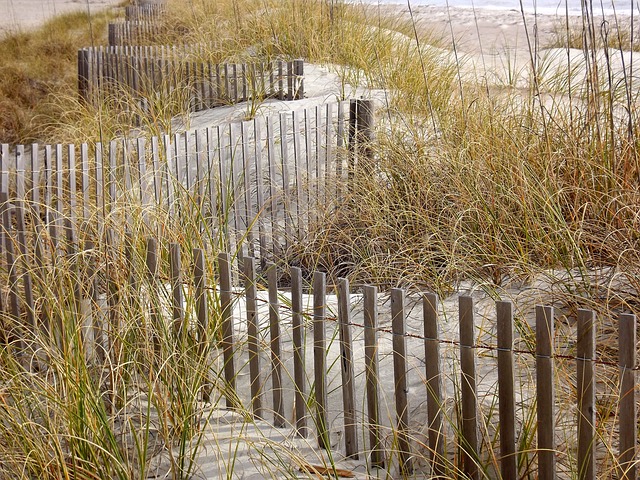In the pursuit of a greener, more sustainable future, New Bedford, MA residents and businesses are increasingly exploring eco-friendly fencing options. This article delves into the diverse and beneficial fencing materials available locally, offering insights on how to make informed choices that contribute to environmental conservation. From residential backyards to commercial landscapes, we explore the advantages of sustainable fencing, including longevity, low maintenance, and local availability, providing practical tips for installation and selection to guide readers in their eco-conscious decisions.
- Understanding Eco-Friendly Fencing Options in New Bedford
- Benefits of Using Sustainable Fencing Materials
- Popular Eco-Options for Residential Applications
- Commercial Settings: Greener Fencing Solutions
- Longevity and Low Maintenance: Key Advantages
- Local Availability and Installation Tips
Understanding Eco-Friendly Fencing Options in New Bedford
In New Bedford, MA, understanding eco-friendly fencing options is crucial for environmentally conscious residents looking to enhance their outdoor spaces. These materials offer a sustainable alternative to traditional fences, addressing both functionality and aesthetics while minimizing environmental impact. Options range from recycled plastic and wood composites to natural materials like bamboo or organic fibres. Each material comes with its unique benefits, such as reduced carbon footprint, longer lifespan, and resistance to rot or pests.
New Bedford’s diverse climate calls for fencing solutions that can withstand harsh winters and hot summers. Eco-friendly options are designed to be durable and weather-resistant, ensuring they maintain their integrity over time. Additionally, many of these materials are easily recyclable or compostable at the end of their useful life, further promoting a circular economy and reducing waste in the region.
Benefits of Using Sustainable Fencing Materials
The use of eco-friendly fencing materials offers numerous advantages for both homeowners and the environment in New Bedford, MA. One of the primary benefits is their sustainability; these materials are typically made from recycled or renewable resources, reducing the carbon footprint associated with traditional fencing. This approach aligns with the growing movement towards a greener, more environmentally conscious community.
Moreover, sustainable fencing options often have a longer lifespan compared to conventional ones, making them a cost-effective choice in the long run. They are designed to withstand various weather conditions and are less prone to rotting, warping, or fading, ensuring a consistent aesthetic appeal. Additionally, many eco-friendly materials provide excellent privacy and security while promoting biodiversity by offering habitats for local wildlife.
Popular Eco-Options for Residential Applications
In New Bedford, homeowners seeking eco-friendly fencing options have a variety of sustainable materials to choose from. One popular choice is bamboo fencing, known for its rapid growth and strength. Bamboo fences offer both aesthetic appeal and durability, making them an ideal option for residential properties. They can be styled in various designs, providing privacy while enhancing the curb appeal of homes.
Another preferred choice is recycled plastic fencing, which is made from post-consumer waste like plastic bottles. These fences are low-maintenance, highly durable, and resistant to rot and pests. The use of recycled materials also significantly reduces the carbon footprint associated with traditional fencing production, making it a compelling option for environmentally conscious residents in New Bedford.
Commercial Settings: Greener Fencing Solutions
In commercial settings, the shift towards eco-friendly fencing materials is gaining momentum, especially in progressive cities like New Bedford, Massachusetts. Business owners and property managers are increasingly recognizing the environmental and economic benefits of sustainable fencing solutions. Traditional fencing options often contribute to land pollution and greenhouse gas emissions due to their production and transportation processes. In contrast, green fencing alternatives, such as recycled plastic, bamboo, or organic wood treatments, offer a more environmentally conscious approach.
These materials not only reduce the carbon footprint but also provide long-lasting durability and low maintenance requirements. For instance, recycled plastic fences are highly resistant to rot and decay, eliminating the need for frequent replacements. Bamboo fencing, known for its rapid growth and strength, adds an aesthetic appeal while contributing to a greener environment. Moreover, these eco-friendly options can enhance the overall aesthetics of commercial spaces, creating visually appealing landscapes that resonate with environmentally conscious customers and employees.
Longevity and Low Maintenance: Key Advantages
Eco-friendly fencing materials offer a unique blend of longevity and low maintenance, making them an attractive option for homeowners in New Bedford, MA. These materials are designed to withstand harsh weather conditions, resist rot, and repel pests naturally, ensuring your fence remains sturdy and visually appealing for years to come. Unlike traditional wooden fences that require frequent staining, painting, and extensive upkeep, eco-friendly options minimize maintenance needs, saving you time and money in the long run.
The durability of these materials is a significant advantage, as they can outlast conventional fencing by decades without compromising aesthetics or functionality. This longevity translates to reduced replacement costs and less waste ending up in landfills, aligning with environmental sustainability goals. Moreover, low-maintenance features allow you to focus on enjoying your outdoor space rather than spending hours maintaining it.
Local Availability and Installation Tips
In New Bedford, MA, eco-friendly fencing materials are increasingly accessible to residents looking for sustainable alternatives. Local hardware stores and garden centers often stock a variety of options, from recycled plastic and wood composites to natural materials like bamboo and hemp. These locally available options not only reduce the carbon footprint associated with shipping but also support area businesses.
When installing eco-friendly fences, it’s important to consider the specific needs of your property. For instance, certain materials may be better suited for wetter areas due to their water resistance. Additionally, local landscaping professionals can offer valuable insights into the best practices for installation, ensuring a sturdy and aesthetically pleasing fence that will serve as both a functional barrier and an eco-conscious statement piece.
